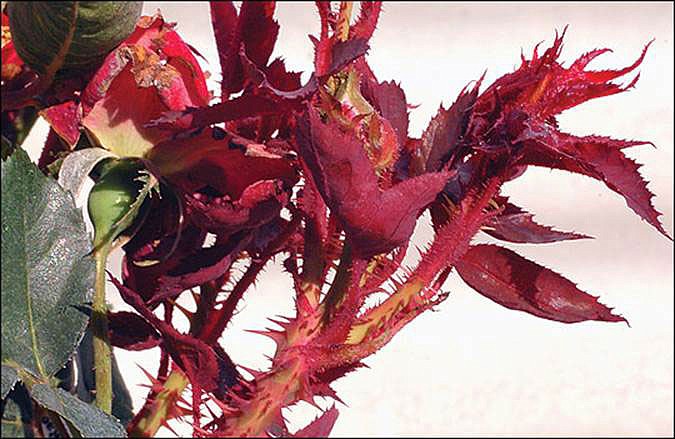Q. I have a Knock Out rose that appears to have rose rosette disease. If I prune it really hard, will it recover and be salvageable?
A. Dear Unfortunate Rose Aficionado, no is the short answer, but this warrants some discussion. First, rose rosette disease more commonly afflicts Knock Out roses then many other roses, like the ever popular hybrid tea roses. The viral disease is often also called "witches' broom" because of the crazy, twisted-up growth that occurs on some branches, and these are often red. These intensely red branches are often a first symptom. As the plant becomes sicker from the virus, it will then become yellow and eventually die.
A hard prune in the spring will often make the plants look a bit better for the current year, so this can be done if that is the only rose plant or if all the roses are affected. The spread of the disease is virtually impossible to stop, as it is by a microscopic mite, and control of this mite with a spray is never possible, let alone practical. Furthermore, there is no spray to kill the virus, which is internal. So complete removal of the plant is critical if other roses are in the area and are currently healthy. One should remove the plant and the larger roots. Destroy by burning or sending to a landfill.
Hybrid tea roses seem to tolerate the disease better, and a hard prune of any branches that show symptoms has been reported by credible sources as an effective way to manage the disease. It never leaves the plant, but some plants survive for many years. The risk with this is that you always have a sick plant that can potentially infect others.
So why are Knock Out roses more susceptible? It is unknown. There may be some genetic similarity with the most common host plant of this disease, the noxious weed, Rosa multiflora. There are still many popular traits of Knock Out roses (i.e., winter hardiness, foliar disease resistance, naturally drops spent flower heads), but one should watch out for this disease.
Q. I didn't plant my vegetable garden in time this year, but saw I still have time to plant squashes, pumpkins, zucchini and cucumbers. Do I have to worry about them cross-pollinating? Someone told me the flavor of cucumbers or zucchini could be affected.
A. Congratulations on doing your homework about vegetables that can be direct seeded in June and still yield a crop as we go into late summer and fall. The question about cross-pollination and affecting flavor has come up in previous years and is so common it is written about by extension centers from a number of states. I am citing comments from a South Carolina (Clemson University) fact sheet.
Cross-pollination doesn't occur with vegetables that are different species, even if the vegetables are similar. Cucumbers and squash are both in the cucurbit family, but cucumber (Cucumis sativus) cannot cross pollinate squash (Cucurbita pepo) because they are two different species.
However, varieties of the same species can cross-pollinate. Yellow summer squash and zucchini are the same species, (Cucurbita pepo), and will cross pollinate. This cross-pollination will not affect the fruit the plants produce this year, but if you save the seed, it will affect the fruit that comes from that saved seed next year. If you plant squash and zucchini close together and save the seed from either, then the fruit from that seed may have characteristics of both. This is especially true of plants that are pollinated by insects or by wind.
Different varieties of sweet corn will also cross-pollinate. Sweet corn is the exception to the rule of cross-pollination not affecting the crop in the current year. If you plant two varieties of sweet corn close together then the seed may have characteristics of both parents in the current year. For example, if you plant a yellow and a white corn together and they cross-pollinate, the ears of either variety may have mixed white and yellow kernels. So there is some truth to the idea or question, but it is specific to corn.
And, no, pollen from a hot pepper won't make a sweet pepper hot.
The Central Missouri Master Gardeners are a volunteer group of 191 members, 122 of whom are Cole County residents, who maintain 11 beautification sites in Cole County, which are nonprofits or public entities. Master Gardeners must complete a basic training program of at least 30 hours of horticultural training, as well as 30 hours of volunteer service. The Missouri Master Gardener program is supported by the University of Missouri Extension.
Have a gardening question of your own? The Master Gardener Hotline is open from 12:30-4:30 p.m. Tuesday and Friday afternoons. Call 634-2824 or stop by the Cole County Extension Center at 2436 Tanner Bridge Road, or email your question to [email protected] for possible inclusion in a future "Ask a Master Gardener" column.

